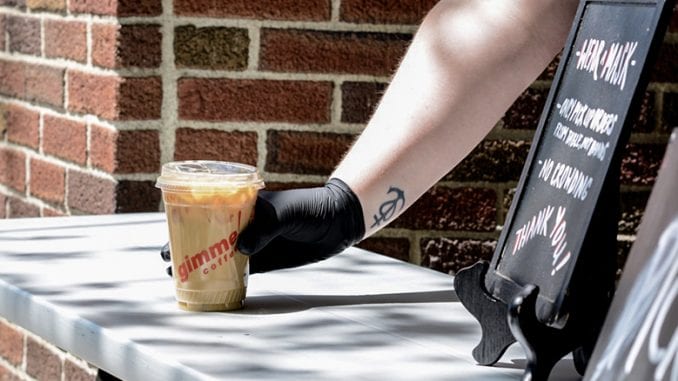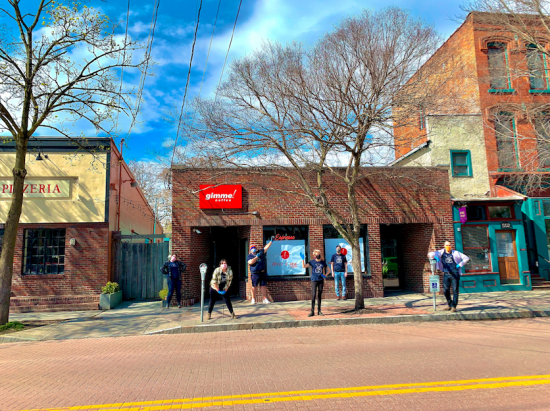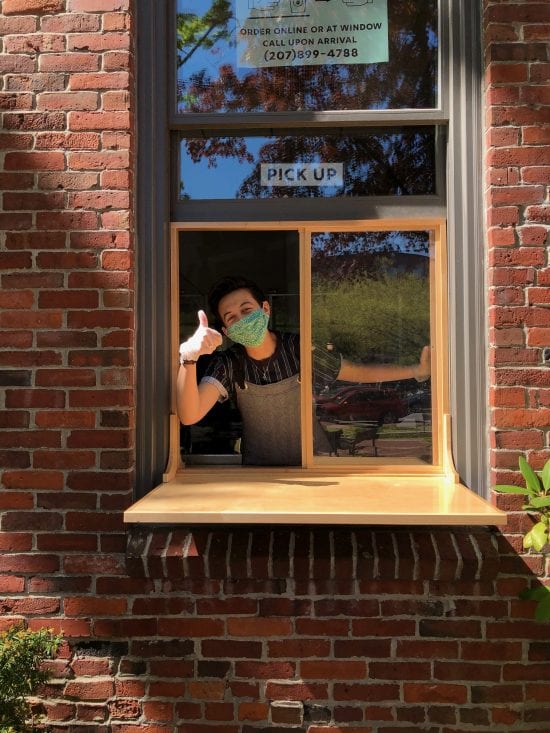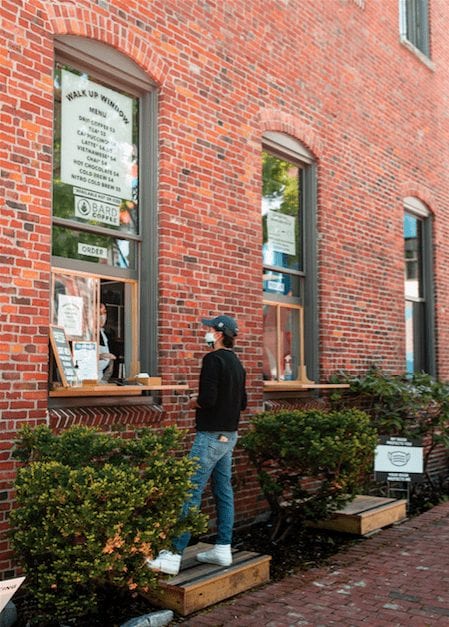
In New York and Maine, two coffee companies prepare for a long journey ahead.
BY MARK VAN STREEFKERK
BARISTA MAGAZINE ONLINE
Cover photo courtesy of Colleen Anunu
The state of New York has more confirmed cases of COVID-19 to date than any country outside the United States. The stringent guidelines necessary to operate a café in New York have led to impactful change for Gimme! Coffee. Meanwhile, in the less affected state of Maine, Bard Coffee has implemented its own safety measures while official guidelines are more relaxed. In part three of our ongoing series about reopening, or operating at higher capacities, during COVID-19, we’re taking a look at these two Northeast cafés, and what the future means to them. Make sure to check out our report on West Coast cafés here, and Southwest cafés here.

As the pandemic ramped up in the state of New York, Gimme! closed all seven of its locations on March 25, including permanently closing their two locations in New York City. They retained a team of 20 employees, nearly all of whom opted to be paid a Tompkins County living wage before securing funds from the Paycheck Protection Program. They brought their attention to their upstate stores, and took a hard look at how to restructure the company to emerge stronger than before. Sixty-five percent of Gimme!’s pre-COVID revenue was from retail. They moved the focus to their roastery, wholesale, and online sales. They have since reopened one location, their MLK Street shop in Ithaca, the site of the original roastery and cupping lab.
Chief operating officer Claire Christensen explains that companies in New York are required to have a business safety plan. The safety plan template they received was seven pages long, included reducing workplace occupancy to 50%, and extensive logging. “The one [thing about the plan] I think is most interesting is we have to keep a list of everyone who comes within the personal space of one of our employees. If someone comes to pick up a delivery and they’re on the other side of a table or barrier, totally fine. If they violate the rules and come into our space, we have to keep track of who they are so if our city needs to do a contact and trace, they’ll have a full list of absolutely everyone that anyone came into contact with,” she says.
At their open location, workers wear masks, are “standing behind four layers of plexiglass,” and have contactless transactions. The café is “completely flipped around,” Claire says. “We put all the shelving out on the front, the delivery driver uses a separate door. We rearranged the grinders, we put the plexiglass up everywhere, and we told our equipment and facilities folks to install that like they mean it to stay.”
Reopening another location for takeout only could happen sometime in the summer, but interim CEO Colleen Anunu is wary about a potential recession and would rather act cautiously, not wanting to draw employees away from the stability of unemployment. “I think the dine-in coffee service is not going to be the same, and we are about a year away from offering coffee dine-in services. There’s a lot of innovation and iteration that needs to happen in the next 12 months, but I feel strongly that we’re going to be able to weather that storm,” she says.
Colleen points out that Gimme! was in the process of making big changes already; COVID-19 just put them on the fast track. They say, “We’re building a stronger company by trying to innovate during this time so that we can have more employee equity. We can build a social impact model, we can have a bigger impact on our community rather than just focusing on fixing issues in retail, we need to be a stronger company overall.”

In Portland, Maine, Bard Coffee closed on March 18, and reopened two weeks ago. Brittany Paolino, Bard’s director of operations, says the only official guidance they received is to do takeout only. “I believe any of the cafés that are open right now are operating more stringently than we’re being told to. Right now we could be open with people coming inside, they just can’t sit. … The only guideline we’ve gotten is that we can do takeout only and that’s it,” Brittany says. “A lot of the cafés that have reopened or stayed open have automatically moved to contactless ordering, picking up, all of that.”

When they reopened, Bard converted two of their windows into walk-up order and pickup stations. Only open five days their first week, they soon had the numbers to justify staying open everyday from 8 a.m. to 2 p.m. Bard has been able to rehire half of their staff, who wear masks on shift. They also adapted to selling bulk drinks like half-gallons of cold brew and lattes. So far, their sales on an average day are down about 20% from their pre-COVID revenue.
When thinking toward the future, Brittany says, “At this point, we don’t see any need to allow people to come back in [the café]. About 50% of customers are walking up with masks on, and 50% are not and don’t even seem to really care. In order to keep our baristas as safe as possible, we’re going to keep doing this as long as we can, and we’re still not really sure what those triggers are for moving to our next phase.”
Stay tuned for our next report on the reopening of cafés across the U.S.

ABOUT THE AUTHOR
Mark Van Streefkerk is Barista Magazine’s social media content developer and a frequent contributor. He is also a freelance writer, social media manager, and novelist based out of Seattle. If Mark isn’t writing, he’s probably biking to his favorite vegan restaurant. Find out more on his website.
